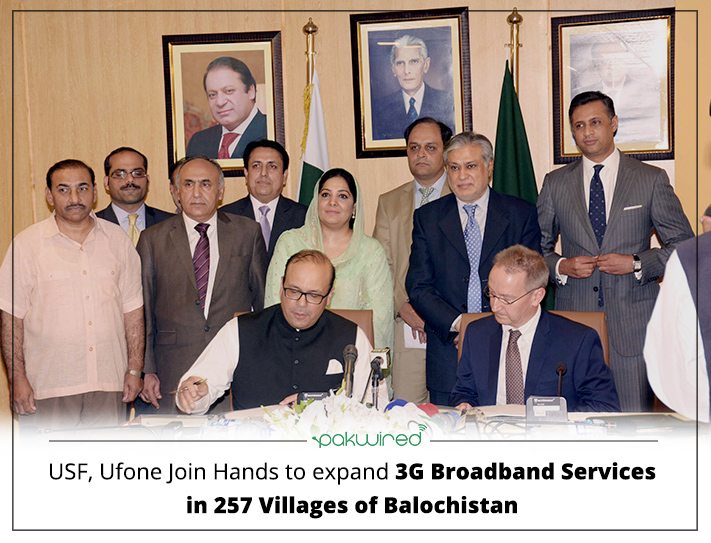Under the Broadband for Sustainable Development (BSD) project, Pak Telecom Mobile Limited (Ufone) has been awarded a funding of PKR 2.33 billion from the Universal Service Fund (USF) to introduce 3G services in backward areas of Balochistan. The deal has been signed today, January 02, by the representatives of both parties, along with the Finance Minister Ishaq Dar and State Minister for Information Technology and Telecom, Anusha Rehman.
About The Project
Under this project, 269 un-served mauzas and an un-served area of 39,434 sq kms will get access to lightning fast broadband internet services. More than 72 new mobile towers will be installed at prominent locations across the Awaran/Lasbela Lot.
The Awaran/Lasbela Lot covers 12.8 % of the area and 6.5 % of the overall population of Balochistan. Awaran and Lasbela districts are also included in this region. The region shares its borders with Panjgoor and Kech in the west, Karachi and Dadu districts in the east, Khuzdar and Washuk in the north, and Gwadar district in the south.
Speaking on the event, State Minister Anusha Rehman said the Universal Service Fund has successfully planned and executed six new projects under the same banner in KP and Balochistan. USF has set a target to reach all under-served and un-served areas of the country with rural telephone and e-Services by 2018.
Furthermore, she shared that 190 villages of Turbat, Gwadar, Ketchh and Panjgur are also being connected under the project. “Under the vision of connecting the unconnected, we are making efforts for maximum digital connectivity”, she added.
The two most important factors impacting the telecom sector over the past decade have been the phenomenal parallel growth of the Internet, and mobile telephone services. The Internet brought the benefits of data communications to the masses with e-Commerce, social networks, and email; while mobile services have enabled wireless networking and communication between devices over short or long distances. The Internet helped accelerate the trend from voice- to data-centric networking.
3G, Broadband and Internet Technologies
3G, also known as third generation, is a wireless mobile telecommunications technology for mobile service providers. These services are provided by mobile operators that own and operate their own wireless networks and sell mobile services to their consumers, usually on a monthly subscription basis. Mobile service providers use an authorized licensed spectrum to provide wireless telephone coverage over some relatively large adjoining serving area. On the other hand, the data rates supportable over 2G systems are still quite limited, offering only between 10 and 20 kbps.
3G Service can support data rates from 384 kbps up to 2 mbps, however, most commercial deployments are expected to deliver the data at a rate of 100 kbps in practice. Nevertheless, it is expected that future upgrades to the 3G or the transition to 4G mobile services will offer much broader bandwidths.
Auctions for 3G spectrum licenses held in a number of countries in year 2000 and the first commercial offerings of 3G services began in Japan in the year 2001.
After the 3G/4G auction held by the PTA in Pakistan in May, 2014, the leading mobile operators have started offering 3G services across all major cities of Pakistan.
image: usf.org.pk


